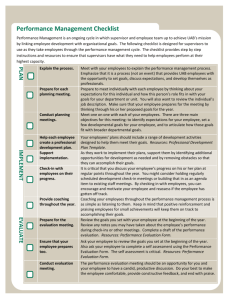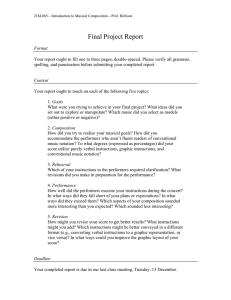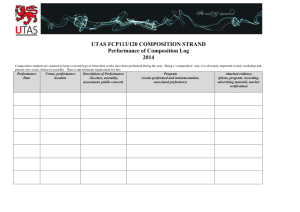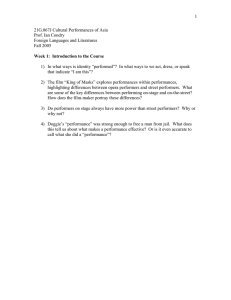LC Paper No. CB(1)1459/02-03(04)
advertisement
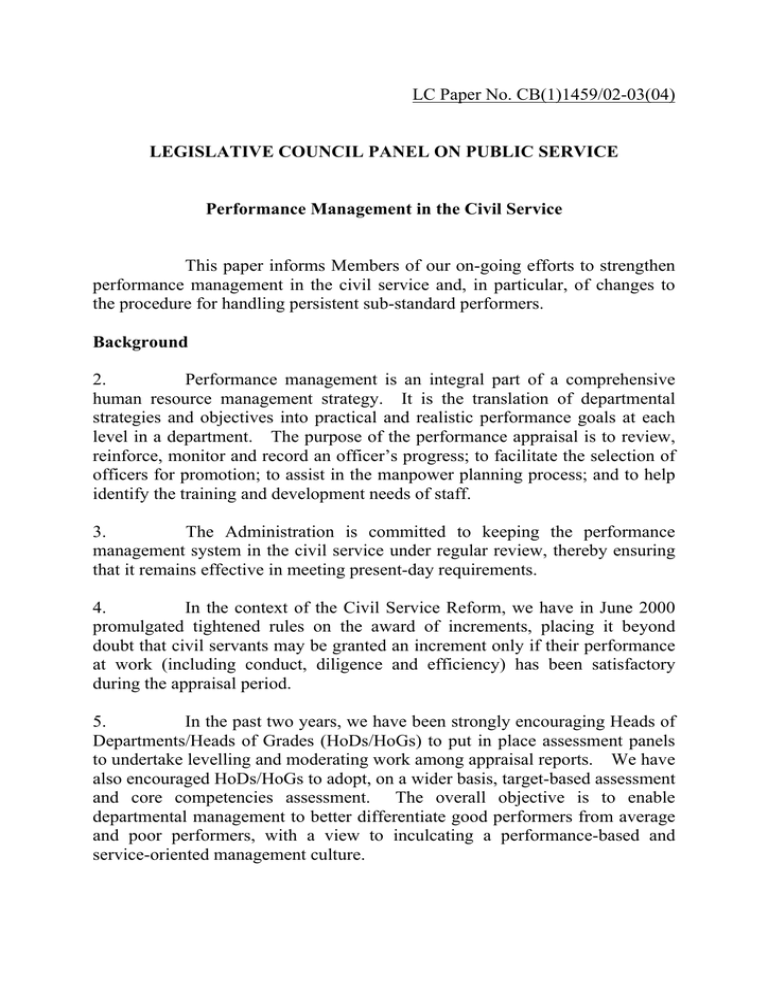
LC Paper No. CB(1)1459/02-03(04) LEGISLATIVE COUNCIL PANEL ON PUBLIC SERVICE Performance Management in the Civil Service This paper informs Members of our on-going efforts to strengthen performance management in the civil service and, in particular, of changes to the procedure for handling persistent sub-standard performers. Background 2. Performance management is an integral part of a comprehensive human resource management strategy. It is the translation of departmental strategies and objectives into practical and realistic performance goals at each level in a department. The purpose of the performance appraisal is to review, reinforce, monitor and record an officer’s progress; to facilitate the selection of officers for promotion; to assist in the manpower planning process; and to help identify the training and development needs of staff. 3. The Administration is committed to keeping the performance management system in the civil service under regular review, thereby ensuring that it remains effective in meeting present-day requirements. 4. In the context of the Civil Service Reform, we have in June 2000 promulgated tightened rules on the award of increments, placing it beyond doubt that civil servants may be granted an increment only if their performance at work (including conduct, diligence and efficiency) has been satisfactory during the appraisal period. 5. In the past two years, we have been strongly encouraging Heads of Departments/Heads of Grades (HoDs/HoGs) to put in place assessment panels to undertake levelling and moderating work among appraisal reports. We have also encouraged HoDs/HoGs to adopt, on a wider basis, target-based assessment and core competencies assessment. The overall objective is to enable departmental management to better differentiate good performers from average and poor performers, with a view to inculcating a performance-based and service-oriented management culture. - 2 - 6. The Civil Service Training and Development Institute (CSTDI) provides a broad range of training programmes on performance management to equip supervisors with the necessary knowledge and skills to allow them to implement a performance management system effectively. CSTDI provides departments with advisory and human resources development consultancy services, including help with the design of performance management systems and development of core competencies. CSTDI also offers advice on adopting a competency-based performance management system and the practical application of the competency framework. To complement central programmes, CSTDI designs and organizes courses based on departments’ specifications and requirements. In addition, CSTDI arranges regular briefings and seminars, inviting departments that have successfully put in place some of the new performance management tools to share their experience with other departments. Review of the procedure for handling sub-standard performers 7. As part of an on-going review process, we have critically re-examined the efficacy of the existing arrangements for handling sub-standard performers. The review shows a tendency on the part of departmental managers to give more than ample chances and time for sub-standard performers to improve and to rehabilitate. In some cases, action to retire an officer under Section 12 of the Public Service (Administration) Order (“Section 12”)(Note) has been made more difficult by over-generous reporting. In other cases, the decision-making process leading to the invocation of Section 12 action involves many layers of officers. The end result is that it often takes an inordinate amount of time for management to process a Section 12 case. 8. The presence of a small number of persistent sub-standard performers is liable to have disproportionate adverse impact on the credibility of the civil service performance management system; and on public perceptions about the productivity and efficiency of the civil service as a whole. We see a clear need to streamline the existing procedure. 9. In coming up with the revised procedure, we are mindful of the need for suitable checks and balances that would help ensure that the legitimate rights of individual officers would be given adequate protection under the revised procedure. (Note) Under Section 12 of the “Public Service (Administration) Order”, an officer may be required to retire in the public interest on grounds of persistent sub-standard performance. - 3 - Revised procedure 10. Following consultation with the staff sides, we issued a Civil Service Bureau Circular in March 2003 to promulgate a set of revised guidelines and streamlined procedure for handling sub-standard performers. 11. Under the revised procedure, an overall “unsatisfactory” performance rating for a 12-month period (together with documentary evidence that the officer has been duly counselled and forewarned) would be a sufficient basis for invoking Section 12 action against the officer concerned, and CSB would follow through the case in three month’s time as a general rule. 12. The key features of the revised procedure include the following – (a) departmental management is to start preparatory steps for Section 12 action promptly, including the giving of written notice about aspects of sub-standard performance and an opportunity for the officer to make representations; (b) advice of an independent panel is to be sought on potential Section 12 cases in order to maintain impartiality and consistency; (c) sub-standard performers are to be given appropriate counseling and assistance, and no less than 6 months to improve their performance; (d) an overall “unsatisfactory” performance rating for 12 months would constitute adequate grounds for taking Section 12 action; and (e) CSB to follow through a normal case within 3 months on receipt of a Section 12 recommendation from the HoD. 13. A credible performance appraisal system is clearly crucial to the success of a performance-based reward system. In promulgating the streamlined procedure for handling sub-standard performers under Section 12 of the PS(A)O, the Secretary for the Civil Service has written to all HoDs personally to enlist their support in ensuring prompt and timely engagement of senior directorate officers in handling under-performers and in further promoting a culture of honest and timely reporting. Once speedy action is seen to be taken on sub-standard performers, it is envisaged that we would have gone a long way in creating a better environment for the culture of honest reporting to take root and in better aligning the performance of our staff management system to the expectations of the community we serve. - 4 - Further improvements to the performance management system 14. Apart from the actions taken to streamline the procedure under Section 12 of the PS(A)O, continuous efforts are being made to improve the civil service performance management system with a view to providing a motivating and positive work environment; and to further inculcating a performance-based, service-oriented management culture within the civil service. 15. In the light of experience since their full implementation in 2001, the operation of the tightened rules on granting of increments will be reviewed. Other improvements relating to the performance management system that are under consideration include the stepping up of central training on performance management for supervisors; and the launching of a Performance Management Guide to provide appraising and countersigning officers with practical tips, practices and skills on performance appraisal, development and improvement. Civil Service Bureau April 2003
